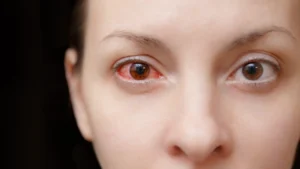Eye Flu: Eye flu, also known as conjunctivitis or pink eye, is an infectious condition that affects the membranes covering the surface of the eyes. It can be caused by bacteria, viruses, or allergies and is highly contagious. In recent times, eye flu cases have been increasing, making it important for people to be aware of the symptoms and take preventive measures. This article aims to provide information about the symptoms of eye flu and suggest ways to avoid its spread.
Read this also: Samantha soothes fans with dreamy pictures from her Bali vacation
Know the symptoms of Eye Flu

1. Redness and Irritation: One of the initial signs of eye flu is redness in the white part of the eye. The eye may also feel itchy, gritty, or irritated, causing discomfort.
2. Watery Discharge: The affected eye may produce excessive tears or a watery discharge, which can be clear or slightly yellowish. This discharge can lead to crusting around the eyelids, particularly after sleep.
3. Eye Discomfort: Eye flu may cause a burning or stinging sensation, making it uncomfortable for the affected person to keep their eyes open.
4. Sensitivity to Light: People with eye flu often experience photosensitivity, where bright light intensifies the discomfort in their eyes.
5. Swollen Eyelids: Conjunctivitis may lead to swollen eyelids, making it appear puffy or droopy.
Know the Preventive Measures of Eye Flu
1. Hygiene and Handwashing: Washing hands regularly with soap and water, especially before touching the eyes, is essential for preventing the spread of infection. Avoid rubbing or touching the eyes unnecessarily, as this can facilitate the transmission of the virus or bacteria.
2. Avoid Sharing Personal Items: It is important not to share personal items such as towels, pillows, eye makeup, contact lenses, or contact lens solution to prevent the spread of eye infections.
3. Use of Tissues or Handkerchiefs: If someone has this infection, encouraging them to cover their mouth and nose with a tissue or handkerchief when coughing or sneezing can help prevent the infection from spreading to others.
4. Proper Contact Lens Hygiene: If you wear contact lenses, make sure to follow proper cleaning and storage practices. Disinfecting your lenses regularly and avoiding wearing them when your eyes are irritated can reduce the risk of the infection.
5. Stay Away from Work or School: It is advisable to stay at home from work or school during the period of infection, as close contact with others can increase the chances of transmission.
When to Seek Medical Attention:
If you experience severe eye pain, impaired vision, or if the symptoms worsen even after taking preventive measures or using over-the-counter eye drops, it is recommended to seek medical attention. An eye care professional can provide a proper diagnosis and offer appropriate treatment options.



